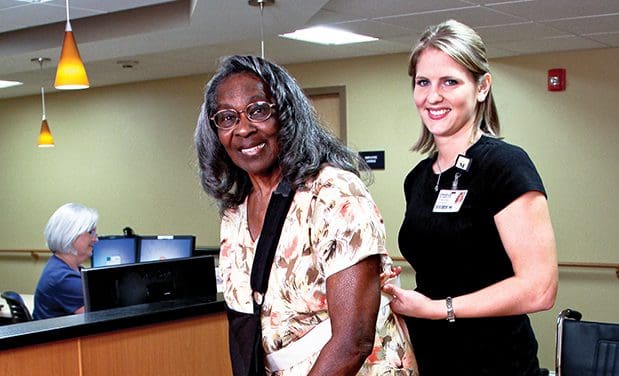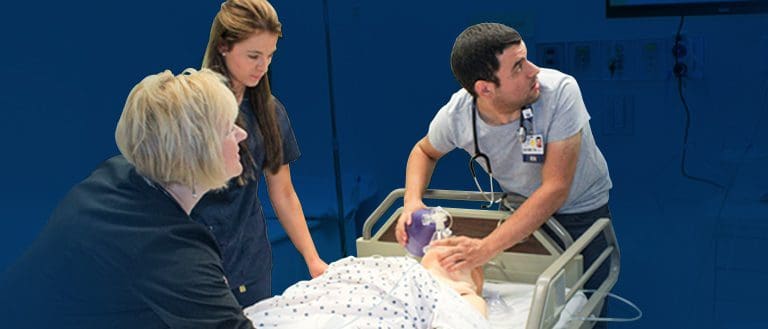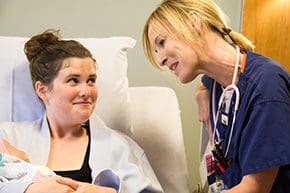RN Residency Program

RN Residency Program
Memorial Hospital’s RN Residency is a year-long program designed to support new graduate nurses during the transition into professional nursing practice.
Goals of the RN Residency Program
- Enhance development of the professional nurse
- Improve job satisfaction
- Foster the development of critical thinking skills
- Provide peer support
- Develop resource utilization
- Reflect on clinical experiences
What is the Memorial Hospital RN Residency Program?
Developed in 2006, the RN Residency Program supports new graduate nurses, nurses who have been practicing for less than one year and those new to the acute-care hospital setting. Over a 12-month period, nurses enrolled in this program gain further exposure to clinical experiences and skills they will encounter while working in a hospital setting. Specialized equipment and supplies are used for hands-on skill practice and high-fidelity simulation is utilized to mimic common high-risk scenarios. Additionally, nurses engage in a peer support group, mentorship programming, and shadowing experiences.
Curriculum
RN Residents attend nine themed sessions utilizing a variety of learning strategies such as lecture, case studies, and discussion. Each themed session also provides dedicated time for reflective practice and peer support. In addition, RN Residents attend one skills day where they practice hands-on clinical skills utilizing equipment and supplies encountered at the bedside. Lastly, RN Residents participate in a simulation day where they practice high-risk, complex, or common clinical scenarios using high and mid-fidelity mannequins. Skills and simulation days offer novice nurses the chance to practice clinical assessment and intervention skills in a controlled, low risk setting.
The goal of The RN Residency Program curriculum is to improve patient care and outcomes through education and support of new graduate nurses.
Residency session themes include:
- Professional Development
- Cardiac and Critical Care
- Skin and Nutrition
- Procedural Areas
- Neurology and Mental/Behavioral Health
- Communication
- Respiratory and Infection Prevention
- End of Life Care
- Current Trends in Nursing
RN Residency Program: Additional Information
In addition to clinical knowledge, the RN Residency Program curriculum focuses on interpersonal skills and professional development. The RN Residency Program’s framework was created using the American Nurses Association’s Scope and Standards of Practice, The Code of Ethics for Nurses, Patricia Benner’s Novice to Expert Theory, and Memorial Hospital’s Professional Practice Model, Relationship-Based Care which was patterned after Dr. Jean Watson’s Theory of Human Caring. Nurses are further exposed to the specialty specific Scope and Standard’s of practice and are encouraged to review them as they progress through the program.
The program curriculum is constantly improving and adapting to the current needs of clinical nurses. To accomplish this, RN Residency Program coordinators facilitate an Advisory board consisting of nursing leadership, clinical nurse educators, preceptors, mentors, former and current residents. Content experts from varying disciplines act as program faculty, providing current, evidence-based information to keep RN Residents up to date on best practices. Lastly, skills and simulation experiences are led by clinical education specialists, all who possess at least a Master’s degree in nursing and have training in adult learning.
If you have questions about the RN Residency Program, please contact us at [email protected]
In This Section
- Overview
- A Message from the Vice President of Patient Care Services/Chief Nursing Officer (CNO)
- Nursing Mission and Vision Statements
- Magnet Recognition
- Nursing by the Numbers
- Professional Practice Model
- Nursing Professional Governance
- RN Residency Program
- Nursing Awards and Recognition
- Research and Evidence-Based Practice
- Quality and Patient Outcomes
- Nurse Well-Being
- Community Outreach by Nursing Professionals
- Nursing Jobs

RN Residency Program
Enhance your transition from school to professional nursing with Memorial.

